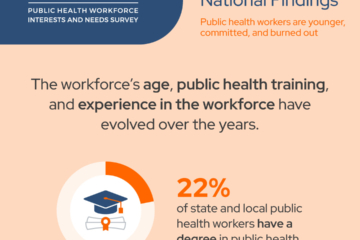When Americans say “health,” they often mean healthcare or health insurance. Our nation spends more money on healthcare than any other developed country, but we rank below comparable countries in nearly every indicator, including life expectancy, heart disease, obesity, diabetes, lung disease, and alcohol- and drug-related deaths. Healthcare that focuses on individuals after they’ve become sick falls short because it doesn’t address the many social and economic factors that influence health.
Think of it like being on a sinking ship. You need to bail the water (paying for health care services, focusing on access and insurance), but that doesn’t solve your real problem (preventing illness in the first place). It only keeps you afloat — temporarily. At some point, you’ve got to find the hole and fix it.
 As the hole has grown larger, we’ve bailed faster and with bigger buckets. Since 1960, health care spending has grown five times faster than the nation’s GDP. We have gone from experiencing unprecedented increases in life expectancy in the last century to an unprecedented three-year decline. Continuing to bail the boat is not sustainable and it will not actually improve the health of our country.
As the hole has grown larger, we’ve bailed faster and with bigger buckets. Since 1960, health care spending has grown five times faster than the nation’s GDP. We have gone from experiencing unprecedented increases in life expectancy in the last century to an unprecedented three-year decline. Continuing to bail the boat is not sustainable and it will not actually improve the health of our country.
Over the past year at the de Beaumont Foundation, we have reflected on these trends, examined our beliefs, and considered what we stand for as a foundation. While the majority of funding, media coverage, and the public’s attention have been almost solely focused on healthcare, we have chosen to stand for something different — health.
Since I became CEO in May 2018, I have led conversations both internally and externally to shape a new vision for de Beaumont. Through these conversations, we have more clearly articulated our belief that every person in every community should have the opportunity to obtain their best possible health. This goes much further than just ensuring access to healthcare or working to reduce costs. Healthcare will always be necessary, and we support increasing access, but we also need to understand that conversations about healthcare and insurance are not enough to improve health.
At de Beaumont, we believe it is necessary to focus on housing, economic development, transportation, and education policy that directly shapes our health. We believe policy is one of the most powerful and effective tools to create optimal conditions for health. Without thoughtful, progressive policy that addresses the root causes of poor health and decreasing life expectancy, healthcare costs will continue to increase and health to decrease.
During this time of reflection, we also have recommitted to a core belief that has shaped de Beaumont from its beginning—our belief in the public health system and workforce. Over the past two centuries, the diseases plaguing our nation have changed from flu to polio to HIV to diabetes. Throughout all of it, the public health system has been a constant—it remains the most essential element in our collective efforts to maintain and improve the health of the public. However, while it may be the most essential, it is likely the most neglected as well.

We also recognize the need to expand our work in developing partnerships. The Practical Playbook was one of de Beaumont’s first multiyear, national projects. It sought to build partnerships between primary care and public health in the service of not only better healthcare outcomes, but also better overall health.
Real progress in health will only come by untangling the complex web of social and economic factors that influence health. This requires strong, multisector partnerships, committed to creating long-term, upstream solutions that address the root causes of worsening health. However, creating these critically needed multisector partnerships will happen only when public health practitioners learn to convey resonant, compelling messages that communicate an inclusive vision for stronger, healthier communities; an understanding of the needs and priorities of other community stakeholders; and the unique value public health practitioners offer. We are committed to building partnerships across sectors critical to identifying and resolving factors contributing to worsening health.
These beliefs when combined with some of our key initiatives — Practical Playbook, CityHealth, BUILD, PH WINS, and others — translated into de Beaumont’s newly refined mission: to advance policy, build partnerships, and strengthen public health to create communities where people can achieve their best possible health. This revitalized mission reflects our intent to double down on the ideas and programs that have been central to our work over the past decade. It represents where we have been and where we are going as we work to create a nation where every person in every community has the opportunity to achieve their best possible health.




